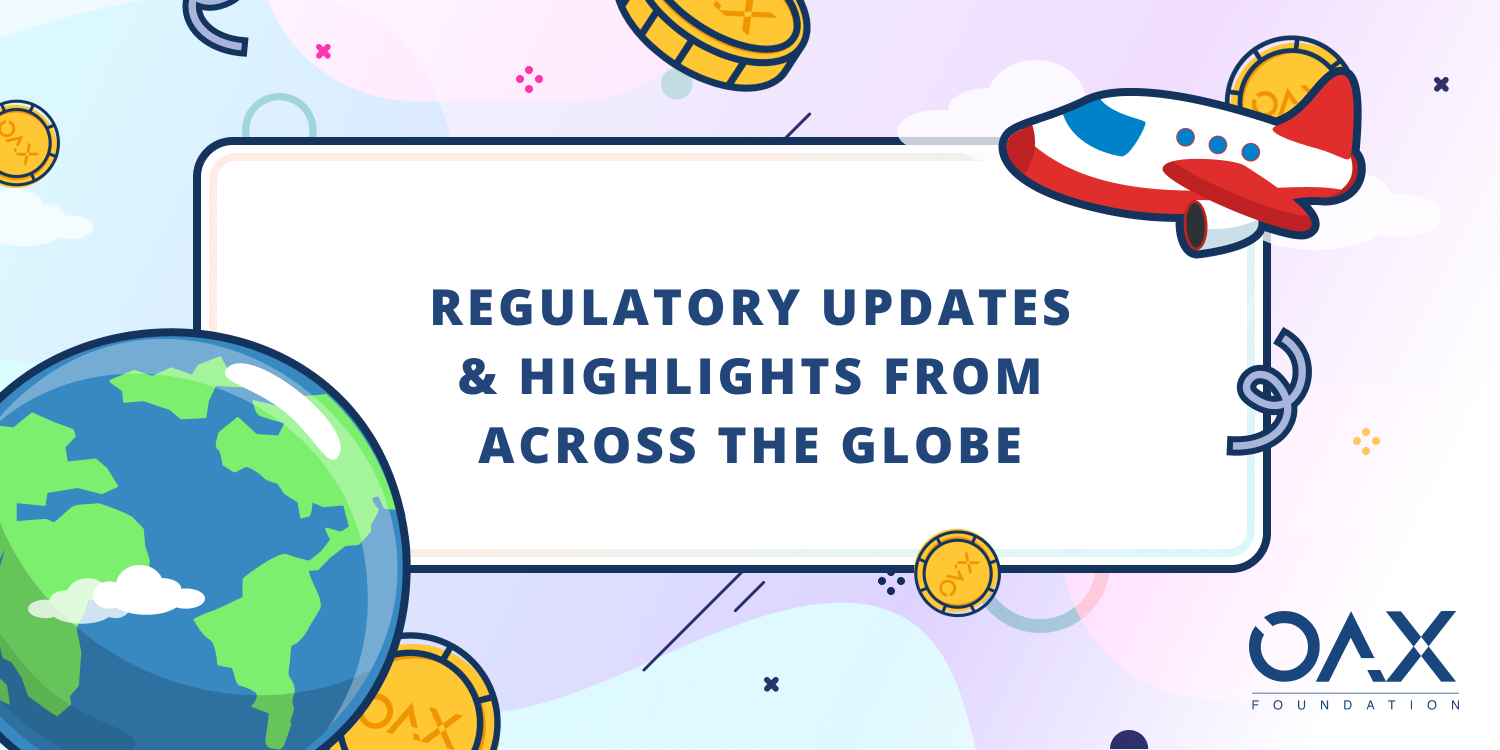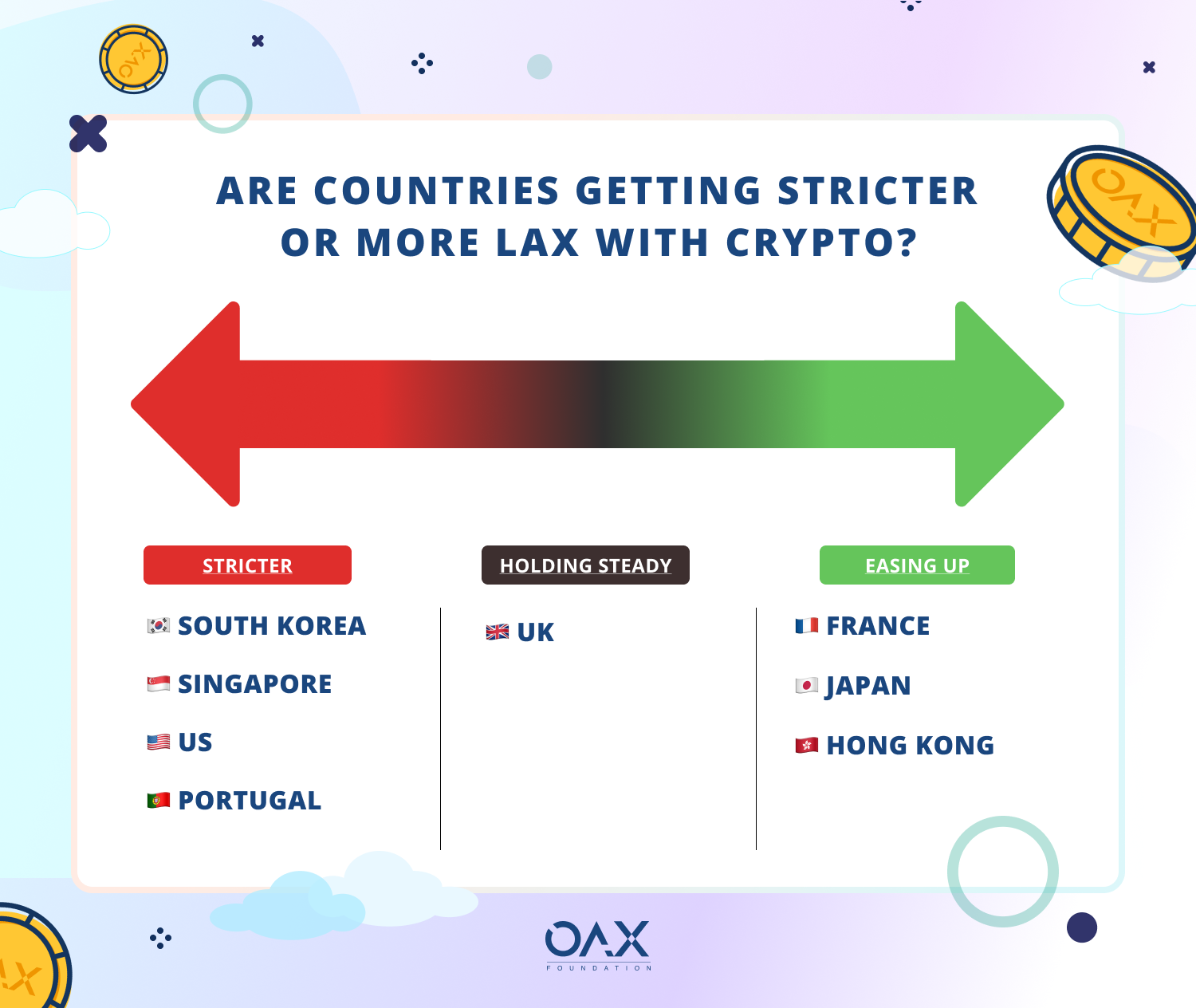
Another Edition of Regulatory Updates From Around the World
We mentioned in one of our previous posts, during a crypto winter most companies have a tendency to focus on the development of their products and services, while governments get the opportunity to play a bit of catch up in the market.
Over the last year, a series of developments in the digital asset industry has expedited regulatory bodies from all over the world to weigh in on their stance towards the industry. Of course regulation from a licensing perspective, financial requirements, and taxation (whether for business or investors) are different aspects that the governments will have to cover when considering the crypto space, but when reviewing the many news updates that are in the market, we must consider everything together as to how it can potentially affect the entire ecosystem.
We’re all for regulatory clarification– and we do believe that regulatory measures should be set to protect the industry and users from nefarious players. But we tread a thin line. Clarity can ideally minimize the risks and uncertainty of having a project’s work dismantled after blood, sweat, tears and resources have been poured in, yet extremely restrictive regulatory measures may simply stifle an industry that has just begun. Innovation requires a certain freedom to explore various routes, and creativity may turn into interesting solutions.
Furthermore, the cross border nature of digital assets and metaverses make it difficult for regulators to work in silo. Urging from the IMF for a ‘Global Regulatory Framework’ earlier this year resonated strongly when we consider the way digital assets work. The summary below of key movements by different jurisdictions around the world demonstrates how wide the gap is between different countries and the confusion that exists in this space. While OECD has been working on a framework to increase international transparency for G20 members with regards to tax evasion, exclusion of any country, even if only with regards to taxation, should be avoided if we want to work on tackling the management of digital assets in a comprehensive manner. And international regulation needs to move quickly. South Korea had expressed earlier this year that they wanted to wait for other global regulatory bigwigs to take the first step before issuing their own crypto regulation but as time continues to tick and the additional pressure they’ve been receiving since the Terra Luna event earlier this year, the Digital Asset Basic Act in turn might be pushed ahead by early next year.
With so many countries weighing in, we’ve only done a snapshot for an overview of this space.


1. European Union
While the crypto assets regulation bill has been under discussion for some time, the Markets in Crypto Asset Regulation (or MiCa as it’s better known) was passed by lawmakers and expected to be voted on by the Parliament before the end of the year. The regulations cover areas including requiring those issuing crypto to publish crypto-asset white papers, while stablecoin companies must be pegged to the euro while being completely backed 1:1. Energy consumption was another area of concern, where regulations now require crypto mining to disclose energy consumption and AML requirements will be included for crypto transferred from payers and payees.
While the framework is probably going to adapt over time, one of the largest gaps in the regulation at present is how NFTs fall under the law. Whether or not they’re considered securities, or how they fall within the existing policy is still currently a gray zone. And at present, the European Parliament is in the process of setting up the foundation for a report that will focus on NFTs, and may play an eventual role in the Commission’s policy.
Within the EU and beyond the MiCa framework, places like France have been advocating their hopes to become the “crypto hub” within Europe, and has set up one of the first crypto licensing regimes, to which the likes of Binance and Crypto.com have already registered, while discussing various tax regimes that will focus on the crypto industry. Once highly favored by crypto enthusiasts, Portugal is now looking to propose a 28% crypto tax in next year’s budget, which leaves us to speculate whether the move is only a financial one or if stricter rules are to come in place.

2. United Kingdom
The UK has been seeing quite a bit of drama in recent days. With the recent appointment of the UK’s latest prime minister, it seems hopeful that digital assets will have an opportunity to grow with PM Sunak’s on-the-record positive stance towards the industry, and his past life in the traditional finance industry as a Goldman Sachs analyst and former finance minister.
Their current intentions of recognizing crypto assets as regulated financial instruments and products within the proposed Financial Services and Markets Bill still leaves many questions within the industry stakeholders, and the Crypto and Digital Assets All Party Parliamentary Group (APPG) has asked the government to provide clarity towards the UK’s approach.

3. United States
Perhaps the situation can be summarized as a state of reporting. In response to President Biden’s executive order in March this year for “Ensuring Responsible Development of Digital Assets”, nine reports have been submitted with frameworks and policy recommendations. In fairness, the approach is comprehensive: from looking at how digital assets are used by payment providers, to environmental factors, to regulatory financial institutions to international standards. We can likely expect many updates from the various boards and political party weigh-ins over the months to come.

4. Singapore
With approximately 15 approvals given by the Monetary Authority of Singapore (MAS), the likes of Coinbase, Circle and Paxos have been making recent headlines with their anticipation to expand their reach within the city-state. Yet there’s been discussions as to how MAS may look to further tighten regulation in the space, from limiting retail investors from engaging in crypto, to how stablecoin issuers may be held accountable for their reserves. Circle, one of the recently approved companies, will be required to hold reserves matching their $43.8 billion USD token equivalent.
The restrictions to retail investors are based on the ideas that generally customers do not hold enough knowledge regarding digital assets and that unless it can be demonstrated that they hold “sufficient knowledge” of the risks that are present with crypto.

5. Hong Kong
And last, but definitely not least, in our roundup this article is Hong Kong, who just hosted the HK Fintech Week last week. Day One of the industry event included a positive direction for those in the industry, with an announcement of a new licensing regime for virtual-asset providers, and discussions on how to develop exchange traded funds (ETFs) in the city, reviewing property rights for tokenized assets. But most importantly, the proposal to roll back from a previous decision, and allowing retail investors to invest in virtual assets has given hope, not only within the crypto community but also by those who believe its part of a larger push to restore the city’s reputation of being a financial center. This may prove beneficial for the Virtual Asset Exchange Licencing Regime (VASP) that will officially take effect by March 2023, should some of these changes be rolled out to licensed entities, which currently has only one regulated entity: OSL Digital Securities Limited. We continue to anticipate the new direction post-Fintech Week and what it might mean for the region.


